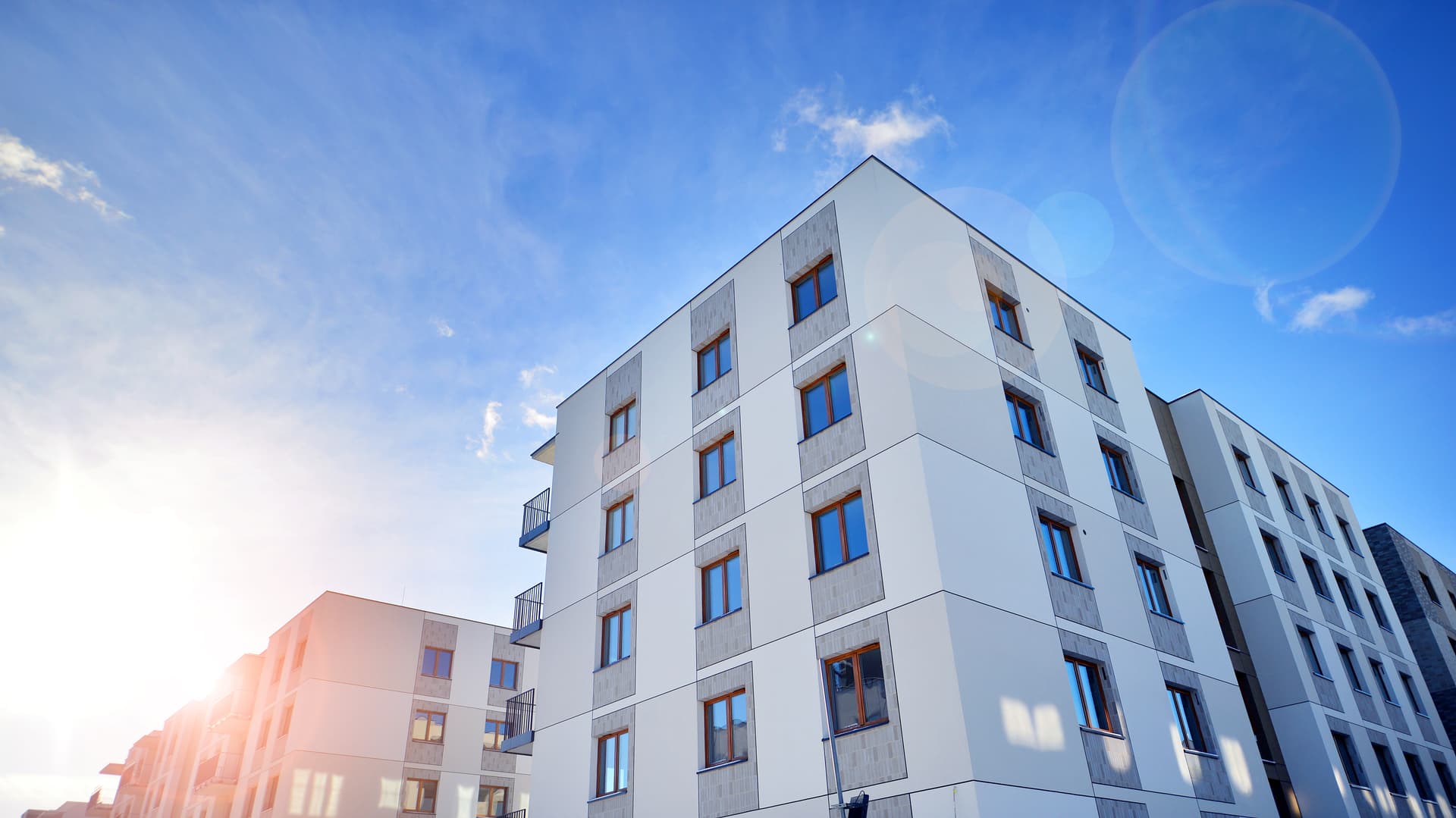
Knowledge

Insulation isn't everything - smaller measures with a big impact
Insulating the façade is one of the most important measures in the energy-efficient refurbishment of a building. Find out here how you can successfully reduce the energy consumption of your property.
Continue reading
Owner's Occupancy: Guidelines, Deadlines, and Obligations for Landlords in Termination
Explore the guidelines for owner's occupancy terminations. Learn about the rights and deadlines landlords must adhere to in order to occupy their property – now in our ACCENTRO Knowledge blog post.
Continue reading
The new property tax: questions and answers at a glance
The property tax reform in Germany: What will change for owners and tenants? Berlin responds with measures. The questions and answers about the new property tax now in our ACCENTRO blog.
Continue reading
End of subsidies for certain gas heating systems in the new year 2023
The issue of sustainability is increasingly coming to the fore for property owners. In order to reduce Germany's CO2 emissions and become less dependent on fossil fuels, the German government is eliminating subsidies for gas heating systems for 2023.
Continue reading
Smart and Efficient: Strategies for Energy-Efficient Living
Learn how energy-efficient living not only preserves the environment but also minimizes long-term costs. Explore practical tips and innovative solutions in our latest blog post.
Continue reading
New calculation of property taxes - what owners need to know
Due to property tax reform, property owners must file an additional tax return this summer. Here's what you need to keep in mind.
Continue readingFor owners

Knowledge nuggets for owners: rights, obligations, options
Do you own residential freehold property? If so, you are part of a group in that is now in a slim majority in Germany. In 2020, Germany’s homeownership rate reached 50.4 percent – Switzerland being the only country in Europe with a yet lower rate at 41.6 percent. While this may sound low, the rate was even lower in 2010, just over ten years ago, when it stood at slightly over 45 percent – meaning it has since followed an upward trend.
The home ownership rate represents the ratio of the number of households that occupy homes they own outright relative to the total number of households considered, the remaining percentage implying the number of rental households. On the European level, the 2020 ranking was topped by Albania and Romania with ownership rates of more than 96 percent.
But the rise in ownership rate in Germany is unsurprising if you consider its appeal and forward-looking benefits. If you own a residential property, you will not only have strong asset value as part of your retirement scheme but also a great way to maintain your liquidity. Naturally, homeownership comes with its own set of obligations and rules. In the following section, we will brief you on everything you need to know about homeownership – from renting and managing your property to upgrades and construction works or expansions, and all the way to the associated costs, rights and obligations. We will also draw your attention to certain options available to you as homeowner.
All articles
- Insulation isn't everything - smaller measures with a big impact
- The new property tax: questions and answers at a glance
- Smart and Efficient: Strategies for Energy-Efficient Living
- Owner's Occupancy: Guidelines, Deadlines, and Obligations for Landlords in Termination
- End of subsidies for certain gas heating systems in the new year 2023
- New calculation of property taxes - what owners need to know
- Homeowners Association Meetings in Times of the COVID 19 Pandemic
- Continued Professional Development for Estate Agents and Residential Property Managers
- The Land Register – What does it Actually Contain?
- How to protect your rental property from freeloaders
- Flooding and heavy rain: how best to protect yourself
- Keep Calm – Not easy to do when exposed to construction noise
- Adding Extra Floors and Converting Buildings Could Deliver 2.7 Million New Flats
Table of contents
Letting and managing residential real estate 1.1 Letting residential freehold property 1.1.1 As of December 2022: right to certified property manager 1.2 A breakdown of rent charges 1.2.1 Digression: operating costs 1.2.2 Rent reviews 1.2.3 Freeloading tenants: proactive measures to take 1.3 Special case holiday home: things to remember when letting your property 1.4 Special case annuitization: how to convert your residential property into income payments in old age
Upgrade and building works 2.1 How to handle minor repairs? 2.2 Subsequent residential property upgrades 2.3 The topic of heating and energy efficiency 2.3.1 Underfloor heating: luxury or sensible alternative?
Basic information, rights and obligations of owners 3.1 Selling a residential property 3.1.1 Important for owners: new calculation of the property tax 3.2 Homeowners association meeting 3.3 Defects, damages and liability issues 3.3.1 Liability after flooding and heavy precipitation 3.3.2 Smoke detectors: mandatory across Germany since 2021
Letting and managing residential real estate
Would you like to let the home you own, and thereby generate a steady, long-term rental income? If so, you should, of course, familiarise yourself with all the costs and obligations involved, lest you be caught off guard by any bad surprises. For instance, tenants are responsible for many of the minor repairs that may become necessary in the property they occupy, but not for all of them.
Letting residential freehold property
The management of tenant-occupied properties can quickly became a serious drain on the owner’s resources. Whether minor defects or major repairs are at issue: Tenants generally expect the owner to respond quickly and to address whatever is wrong with the rented premises at once.
If, as a result, managing your rental property on your own becomes too much, a common alternative is to bring in a so-called property manager. The job of the manager is to maintain the so-called common property in a multi-unit residential building, ensuring its proper upkeep and repair. Property managers will also administrate the building’s community funds and maintenance reserve. For example, they ensure that waste is regularly disposed of by proper waste removal services, that the staircases and hallways are cleaned or that the central heating system, where applicable, is correctly serviced.
Having a good property management on the job means a lot and it will save owners a lot of work – especially if they own a multi-family house with tenant-occupied units. But even in the case of individual households, for instance when letting a single-family detached home or terraced house, having a third-party management can provide invaluable support. It keeps the many, small concerns of property management off the owners’ desks and minds, while the tenants occupying their properties feel well taken care of at the same time.
But how do you find a good property management, and what do you need to bear in mind when selecting one?

As of December 2022: the right to a certified property manager
There is a special aspect that should also be mentioned here: As of December 2022, homeowners have a legal right to a so-called certified property manager. In order to obtain such a certificate, an aspiring property manager has to demonstrate before a given Chamber of Industry and Commerce (German “IHK”) that he or she has the legal, commercial and technical qualifications required for the job. Applicants can submit to the examination at any German chamber of industry and commerce regardless of their place of residence or principal office. Only property managers who passed the examination before a chamber of industry and commerce may call themselves “certified property manager” in future.
By the way, continued professional development has been mandatory for property managers since August 2018. In the past, it sufficed to simply register for this kind of business activity, whereas now the new law governing the compulsory continued professional development mandates a demonstrable and continuous expansion of the vocational training scope. Ways to comply with the requirement include in-house training classes for those in this line of business, online webinars, or conventional classroom teaching. For more information on continued professional development and the associated rights and obligations, see this article.
A breakdown of rent charges
Residential rents (also called rent charges) break down into various components that are briefly detailed below. A breakdown of the components makes sense insofar as terms like “basic rent” and “rent inclusive of heating” or “gross rent” and “net rent” are likely to confuse people who are unfamiliar with the backgrounds and composition of rent charges.
Let us start with the net rent or “basic rent,” which represents the main component. This term designates the agreed square-metre price of a given rental unit and refers exclusively to the lettable area of that unit. The second main component of the rent or rent charge is the so-called gross rent. This term is used whenever the lease agreement delegates management of the service charges and operating costs to the tenant.

Digression: operating costs
The term “operating costs” designates the running costs the owner of a property incurs through the maintenance of the property, including when letting its premises. The operating costs need to be distinguished from the administrative overhead and the maintenance and repair costs of a residential property – for more on this subject, go to the “Upgrade and Construction Works” section.
However, owners do not have to cover the entire operating costs on their own, as some can be recovered from the tenant. To permit the cost allocation, the arrangement must be agreed upon in the lease. Such an operating cost arrangement specifies which operating costs of a given apartment are recoverable and which ones are paid by the owner.
Most lease agreement in Germany stipulate that the tenant covers the operating costs and that the monthly rent charge shall include an advance payment on the operating costs on top of the basic rent. Inversely, owners are under the obligation to submit periodic settlements – and this is easier said than done in practice. According to the DMB German Tenant Union, every other service charge statements includes faults and errors.
To find out more about operating costs that can be recovered from your tenant and about other aspects to remember in this context, read our related article.
The term “basic rent” is rarely used anymore these days, with the term “net base rent” having gained currency instead. For tenants, this term implies that any extra expenses arising in connection with the heating system are not included in the respective amount, but will be added separately.
The term “rent inclusive of heating” originally referred to the amount of the net base rent with all service charges for water and heating included, so that the quoted amount factually represented the “all-in rent.” Technically, however, the proper terms would have to be “gross rent inclusive of heating” because it covers the total amount charged to the tenant.
After a ruling by Supreme Court of Justice in 2010, use of the term “rent inclusive of heating” is, strictly speaking, no longer acceptable on the German rental market. According to the new jurisdiction, the operating costs of an apartment may only be billed on the basis of the actual amount consumed, and may not be charged in the form of a flat rate. The background to this is that the “rent inclusive of heating” traditionally ignored the tenant’s actual consumption, potentially putting lessors and owners at risk. Going forward, the term “gross rent with heating included” will no longer be used in Germany either.

Rent reviews
Rent reviews or rent increases are a sensitive subject, both for tenants and owners. Many lessors fear that their tenants will generally balk at the idea of a rent review and principally object to it. However, there are scenarios that make rent increases easier to accomplish.
Although the rent charge is contractually stipulated in the lease, so that a review or increase will always require the tenant’s consent, landlords have the express right to demand that consent. Specifically, German law requires tenants to consent to a rent increase as long as the new rent level does not exceed the so-called “local benchmark rent.” This benchmark rent is established by the municipality on the basis of all rents that are locally paid for comparable residential accommodation. In major German cities, the local benchmark rent will be quoted in the local rent index.

Another legitimate reason for a rent review is the completion of “energy efficiency upgrade measures.” If, for example, a new heating system is installed or if the windows are replaced, landlords may increase the rent by up to eleven percent annually of the costs incurred through the upgrades.
In addition to the aforesaid possibilities, there are other options for owners to legitimately claim a rent increase.
Freeloading tenants: proactive measures to take
It is a nightmarish scenario that many owners dread who plan to let their properties: the idea that freeloading tenants could move in without any intention to pay the rent or to pay it in full. But how do you read the mind of a prospective tenant before he or she signs?
In theory, you should be able to eliminate the risk by having tenant leads fill in a questionnaire that covers all relevant disclosures and details about them. In addition, the owner should obtain credit reports on prospective tenants, for instance from the SCHUFA German credit protection agency. If there are no anomalies at this stage, there is a good chance that the applicant is a reputable tenant.
If things take a bad turn nonetheless, the question that inevitably presents itself is this: How do you minimise the damage if you have a freeloader on your hands? In the case of non-payment of rent, the tenancy can be terminated via a claim for possession; but taking such legal action comes with considerable costs for landlords. So, the best way remains to protect yourself comprehensively against freeloading tenants ahead of time and to know your options in case a freeloader does manage to move in after all.

Special case holiday home: things to remember when letting your property
Not so very long ago, it used to be possible to let any residential property to tourists, trade fair attendees and other visitors in quick and easy ways – and a lucrative proposition it was. But with the growing shortage of affordable housing and the boom in property prices and rents, the rules governing holiday homes have been tightened. Lawmakers hope to curb the misuse of residential property for other purposes and thereby to alleviate the housing shortages.
What constitutes a misuse of residential property, for instance, is the letting of your primary or secondary place of residence to tourists, leaving it vacant for more than three months, or using it exclusively for commercial purposes. Many German municipalities and cities tightened their regulations for preventing the misuse of residential property by introducing an authorisation requirement.
In addition to owners, the requirement also applies to platforms such as Airbnb whose business model is based on the short-term private letting of residential accommodation. The relevant regulations differ from one city to the next, as do the penalties imposed in the event of non-compliance.
With this in mind, you should carefully consider the bureaucratic hurdles, the permitted length of temporary lease terms and the reduced rental yield before investing in a property in order to let it to temporary guests – especially in conurbations with strained housing markets and therefore strict regulations. To learn more about the subject of letting secondary places of residence and holiday apartments, read our related article.
Special case annuitization: how to convert your residential property into income payments in old age
In retirement, homeownership principally implies a greater chance to spend your last phase in life without major financial worries. Even if your pension payments turn out to be lower than expected, there is plenty of cash tied up in your property. But how do you monetise a residential property without losing your right of occupancy after selling or letting it?
This is where a fascinating scenario comes in that combines a partial or complete sale with the right of abode and usufruct. The concept of usufruct gives a person the limited real right to use or enjoy a thing owned by another party. In the case of a residential asset, this means: Despite the full or partial disposal of a given property, the original owner and seller retains the right to live in the property.
Aside from a usufruct sale, there are other attractive ways to maintain your liquidity in old age on the basis of property ownership.

Upgrade and building works
Upgrades are extremely important for a strained housing and land market. According to a survey conducted by the University of Technology at Darmstadt, a total of 2.7 million new apartments could be created by adding extra floors or through conversions, meaning without the need for green-field development or the provision of new infrastructure.
But many owners are reluctant to subject their properties to major construction works. Which is understandable at first glance: Measures to enhance the quality of living are initially paid for in full by the owner, not by the tenant. Although the costs can ultimately be recovered via rent increases over time, the owner faces a major initial investment.
How to handle minor repairs?
One option particularly relevant in case of minor repairs, is to split the costs for these measures, for example at the time a tenant moves out after a long tenancy. Painting or wallpapering an apartment, repainting interior doors or plugging holes in the walls: Even such comparatively small jobs can still run up costs in the three- to four-digit range in some cases.
A recent ruling by the Supreme Court of Justice (BGH) on the subject of minor repairs will probably affect a large number of tenancies. It states that the landlord is, principally speaking, responsible for the upkeep of a rental apartment. However, one option to transfer responsibility for minor repairs to the tenant under certain conditions is to include a provision to this effect in the lease agreement. Important to note in this context is that such a transfer presupposes that the tenant took the apartment over in unrefurbished condition.
Whenever tenants move into an unrefurbished apartment whose condition keeps deteriorating, they have legally the right to demand a refurbishment. In this case, however, the tenant cannot expect the owner to shoulder the entire costs of the refurbishment. Instead, they are usually split evenly among the two parties.
Another important aspect for owners is to know what sort of alterations tenants may or must undertake on their own. According to the Haus & Grund property owners’ association, tenants may or must adapt the conditions of their rented accommodation autonomously as long as they do not interfere with the building fabric. This makes it all the more important for all stakeholders to know exactly which measures qualify as structural alterations.

Subsequent residential property upgrades
Especially ageing properties that have been occupied by the same tenants for long periods of time often require upgrade measures while the tenants remain in their dwellings. The problem here being: Structural alterations tend to involve a lot of construction noise, compromising the quality of living for the incumbent tenants. What is the best way for owners to accomplish these measures without major issues?
Important here is one factor above all: Property management, tenants and the other owners—which may come into play in the case of multi-family houses—need to be notified about any restructuring work well ahead of time. Yet even when duly informed, tenants remain exposed to the construction noise, and this will prompt some tenants to demand a rent reduction.
In a first step, such complaints should be passed on directly to the principal or the contractor in order to confront them with the issue and to motivate them to make changes. If this fails to lower the noise level, the tenant may in a next step file a complaint with the municipal public order office or take action under civil law.
A rent reduction on the grounds of upgrade measures may have to be granted if the tenant or owner can prove that the construction works are causing significant disturbances and impairments.
The topic of heating and energy efficiency
The topic of thermal insulation and energy efficiency is more relevant than ever today. Energy efficiency upgrades should be seriously considered, at the latest, when energy prices and heating bills start soaring. Especially thermal insulation can save you a lot of energy and thus ease the strain on your budget.
Many measures to improve the energy efficiency are eligible for various public funding programs as long as the measures ensure that the respective building meets certain standards afterwards.

Underfloor heating: luxury or sensible alternative?
In the eyes of many, having underfloor heating in the bathroom is sheer extravagance. But heating your floor is generally barely more expensive than using wall-mounted radiators. After all, underfloor heating causes the heat to rise up from the floor and to spread evenly throughout the room before radiating down from walls and ceiling. The system is actually a better way to stabilise the ambient temperature than conventional heating is. Aside from underfloor heating, there are other alternatives to conventional wall-hung radiators: Ceiling and wall heating systems come with environmental and economic advantages while saving space at the same time.

Basic information, rights and obligations of owners
Selling a residential property
With property prices rising steadily and the market booming, apartment owners are currently in a position to sell their property at a tidy profit. The idea will immediately prompt the question what kind of costs sellers face.
The answer depends not least on the decision whether or not to bring in an estate agent. The job of an estate agent is to take care of certain tasks that would otherwise involve a major effort for the seller, such as determining an arm’s length selling price, a task that, without an agent, would necessitate an expert valuation. A current energy performance certificate is also mandatory.
There are other costs that will be incurred when selling, such as notarial fees, land register fees and possibly a property speculation tax, that owners need to familiarise themselves with ahead of time.
Speaking of land register: While the term keeps coming up in any number of contexts, few know exactly what it means. Taken as a whole, it represents a central register listing all plots of land within a given district or municipality. Each land register folio contained therein provides basic property details, such as location, ownership, as well as the owner’s rights and encumbrances. Learn more about the land register in our related article.
Important for owners: new calculation of the property tax
Pursuant to a ruling by Germany’s Supreme Court of Justice from summer of 2022, property owners will need to start filing tax returns again. What exactly this implies and which steps it will require is transparently detailed in a separate article we compiled for your convenience.
Homeowners’ association meeting
The gathering of homeowners is an important element in homeownership law. Only by casting their votes can apartment owners legitimately express their will, whereas those who are absent cannot cast their votes.
The agenda items of a meeting may include, for instance, building works involving the common property in the building, the appointment of a new manager or special assessments. In times of pandemic-related restrictions, however, convening a homeowners association meeting is easier said than done. In response to the current situation, far-reaching special rules were passed over the past few years that permit the organisation of hybrid homeowners association meetings.

Defects, damages and liability issues
In theory, any defect that a given property may have should be disclosed to the buyer at the time of its acquisition – but what if issues do not come to light until after? In fact, years may pass before you become aware of defects like mouldy walls or leaky pipes. So, who is liable in such a case: buyer or seller?
An important rule to remember in this context: The seller is legally required to deliver the sold object free of material defects and legal imperfection in title to the buyer. A material defect refers to the building fabric, whereas a legal imperfection may be, for example, an encumbrance entered in the land register such as a mortgage or usufruct.
In order to avoid unpleasant surprises, information about possible material defects and legal imperfections in title should be obtained from the seller before signing the deed. Conversely, the seller is well advised to communicate any such deficiencies openly and honestly in a proactive effort to prevent issues and disputes later on.
Liability after flooding and heavy precipitation
Speaking of the prevention of issues: Force major, such as in the form of storms, is one of the most common causes of property damage. While it is rarely possible to prevent damages altogether, their extent can definitely be reduced.
Decisive for the effectiveness of preventive measures is primarily the location of a given property: Buildings set into a hillside can often be protected from flooding by diverting the water past the property, e. g. through the use of berms. There are ways to contain roof drainage, too: rainwater can be collected via gutters, downspouts and cisterns to keep the initial run-off away from the ground and the foundation. This arrangement come with an added benefit: You can later recycle the harvested rainwater.
While there are any number of options to achieve effective flood control, property owners should definitely consider taking out insurance coverage against damage by natural forces for additional protection against natural hazards such as heavy rain, floods, high water, snow and avalanches, subsidence, earthquakes, etc. as necessary.

Smoke detectors: mandatory across Germany since 2021
The installation of smoke detectors is now mandatory for private residential accommodation throughout Germany. This means: Any new or converted building not yet equipped with smoke detectors should be retrofitted immediately by the landlord or property owner. Even in Berlin and Brandenburg, where a transitional period applied through the end of 2020, smoke detectors have been mandatory as of 2021.
The associated implementation guideline applies to both new-build apartments and new owner-occupied homes. Owner-occupiers are responsible for the installation of the devices on their own; in the case of rented apartments, the landlords are obliged to pay for the initial purchase of the devices and for their installation by a specialist company. While tenants are at liberty to install smoke detectors in their homes at their own expense, doing so will forfeit their right to reimbursement by their landlords.
Conclusion
Property ownership comes with all sorts of benefits, be it in the form of increased liquidity through rental income, a more affordable alternative to renting, added security in retirement or the prospective returns on investment. That said, ownership is also an obligation under Germany’s basic law. The obligations and associated costs that come with property ownership are not insignificant. But nobody who is well-informed and well prepared has anything to worry about.

For these and other topics involving real estate, browse our knowledge blog at: https://accentro.de/en/knowledge

The new property tax: questions and answers at a glance
The property tax reform in Germany: What will change for owners and tenants? Berlin responds with measures. The questions and answers about the new property tax now in our ACCENTRO blog.
Continue reading
End of subsidies for certain gas heating systems in the new year 2023
The issue of sustainability is increasingly coming to the fore for property owners. In order to reduce Germany's CO2 emissions and become less dependent on fossil fuels, the German government is eliminating subsidies for gas heating systems for 2023.
Continue reading
Continued Professional Development for Estate Agents and Residential Property Managers
Anyone permanently and regularly employed in the estate agency business or in the management of multi-tenant residential buildings on behalf of third parties should embrace the idea of mandatory life-long learning.
Continue reading
Flooding and heavy rain: how best to protect yourself
Waterproof windows, backwater valves and cisterns – there are numerous tips and tricks that can help you keep high water and heavy rain from entering your home from all sides.
Continue reading
Smart and Efficient: Strategies for Energy-Efficient Living
Learn how energy-efficient living not only preserves the environment but also minimizes long-term costs. Explore practical tips and innovative solutions in our latest blog post.
Continue reading
New calculation of property taxes - what owners need to know
Due to property tax reform, property owners must file an additional tax return this summer. Here's what you need to keep in mind.
Continue reading
The Land Register – What does it Actually Contain?
Page after page filled will names and figures – although its name is often mentioned, many have only a vague idea what the land register actually is, and what sort of information it provides.
Continue reading
Keep Calm – Not easy to do when exposed to construction noise
So, you just bought a home, got the land register entry taken care of pronto, and are now in possession of the keys.
Continue reading
Owner's Occupancy: Guidelines, Deadlines, and Obligations for Landlords in Termination
Explore the guidelines for owner's occupancy terminations. Learn about the rights and deadlines landlords must adhere to in order to occupy their property – now in our ACCENTRO Knowledge blog post.
Continue reading
Homeowners Association Meetings in Times of the COVID 19 Pandemic
The manager of a given homeowners association (HOA) is obliged to convene a general meeting of homeowners at least once a year and to invite all homeowners for the occasion.
Continue reading
How to protect your rental property from freeloaders
Being cautious is always a good idea. When it comes to freeloading tenants, however, this is easier said than done: How do you read the mind of a prospective tenant before he or she signs?
Continue readingAdding Extra Floors and Converting Buildings Could Deliver 2.7 Million New Flats
The lack of development land is one of the biggest obstacles hampering efforts to combat the housing shortage in Germany. Especially in the conurbations, where the housing shortages are most pronounced...
Continue reading